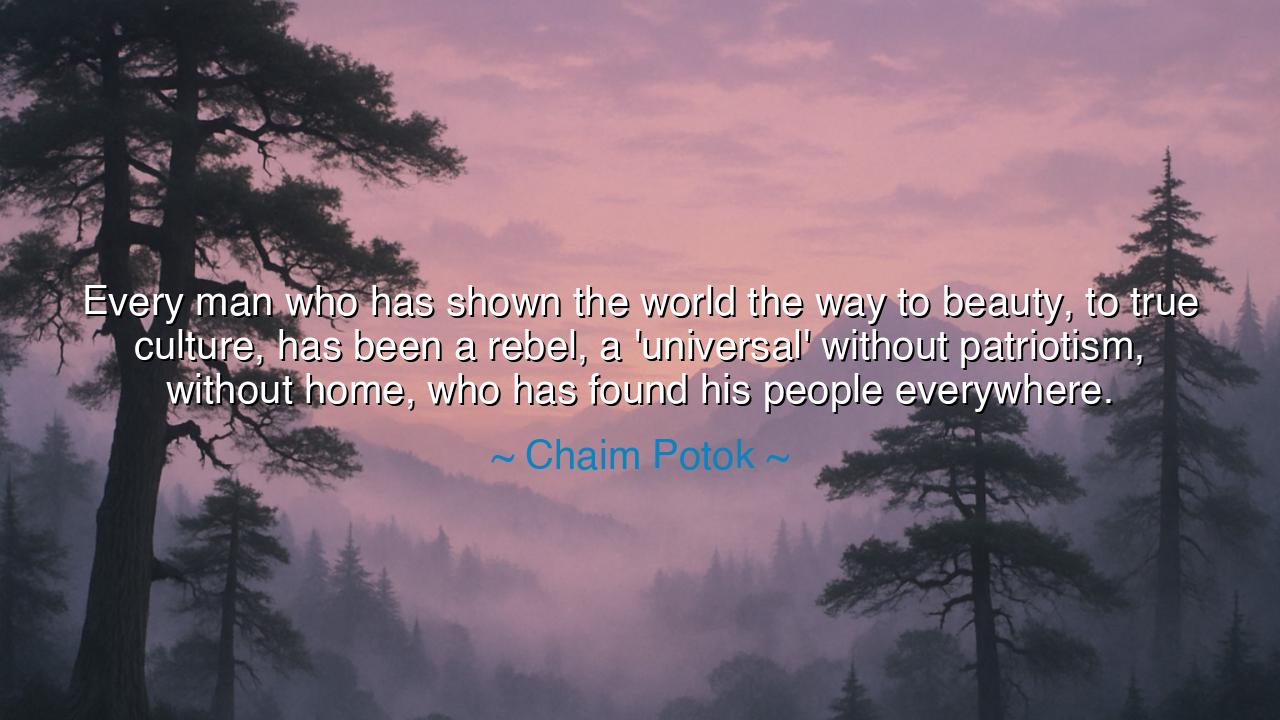
Every man who has shown the world the way to beauty, to true
Every man who has shown the world the way to beauty, to true culture, has been a rebel, a 'universal' without patriotism, without home, who has found his people everywhere.






The words of Chaim Potok—“Every man who has shown the world the way to beauty, to true culture, has been a rebel, a 'universal' without patriotism, without home, who has found his people everywhere.”—resound with the fire of timeless truth. In them we hear a call to recognize that those who shape the destiny of the human spirit are not always the obedient sons of their nations, nor the guardians of their tribe’s narrow traditions, but the wanderers, the outcasts, the seekers. Such souls are bound not to a single flag, but to the vastness of humanity itself. They are rebels, for they refuse to confine their vision to borders. They are universals, for they see every man and woman as kin.
The ancients knew of such men. Socrates, who questioned the foundations of Athenian society, was condemned by his own city as a corrupter, yet his words outlived the stones of Athens and belong now to all peoples. Diogenes, who called himself a “citizen of the world,” had no home, yet his piercing truths stripped away falsehood wherever he went. These men were rebels not because they sought destruction, but because they dared to seek a higher harmony beyond the limits of custom. Their loyalty was not to patriotism, but to wisdom, to the eternal beauty of truth.
Potok’s insight shines especially in the world of art. Consider Leonardo da Vinci. Though born in Italy, his mind roamed beyond the loyalties of Florence or Milan. He belonged not to one city, but to all of Europe—and, in truth, to all of humanity. His genius in painting, engineering, and science was too vast to be confined by political borders. He was a universal, offering his vision of beauty and knowledge to every generation that came after him. His home was wherever his sketchbook lay open, and his people were all who could see the wonder in his creations.
History gives us another striking example in the life of Rabindranath Tagore, the Indian poet who spoke to the world with verses of love, peace, and human unity. Though deeply rooted in India’s traditions, he rejected the narrowness of militant nationalism. He wrote, “Patriotism cannot be our final spiritual shelter; my refuge is humanity.” Like Potok’s rebel, Tagore reached beyond borders, offering songs and poems that the whole world could claim as its own. His Nobel Prize was not only for India, but for all who seek the universal language of beauty.
The meaning of the quote is profound: to bring forth culture that endures, to reveal beauty that transcends ages, one must often step beyond the safety of belonging. To be a rebel is to resist the chains of custom, to endure the suspicion of one’s own people, and yet to keep walking toward the universal. Such men and women are never rootless in truth, for though they abandon the narrow shelter of one home, they find their dwelling in the heart of humanity itself.
The lesson is clear: if you would create something lasting, do not fear being misunderstood, nor condemned as disloyal. The one who clings too tightly to patriotism risks limiting their vision to their own tribe. But the one who dares to see all peoples as brothers and sisters will uncover truths that shine for eternity. True culture does not exclude—it gathers. True beauty does not divide—it unites. The greatest gifts of mankind were born not in obedience, but in courage, not in conformity, but in rebellion of the spirit.
Practical action flows from this wisdom. In your own life, seek to expand your heart beyond the narrow walls of identity. Love your homeland, but do not let it blind you to the worth of others. Read widely, listen deeply, and embrace what is noble in every culture. Do not fear being called a rebel if your conscience leads you beyond tradition, for it is often the rebels who reveal new paths. Remember: to find your people everywhere, you must first dare to see the whole world as your home.
Thus, Potok’s words endure as a teaching to future generations: the bearers of true beauty and lasting culture will always seem out of place in their own time. They will be accused of disloyalty, of lacking a home, of being “too universal.” Yet it is they who will light the way, for they know that the truest homeland of the human spirit is not found under one flag, but in the shared soul of all mankind.






AAdministratorAdministrator
Welcome, honored guests. Please leave a comment, we will respond soon